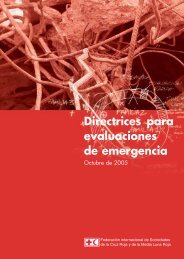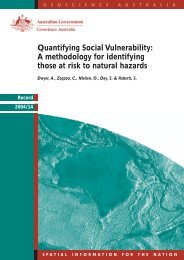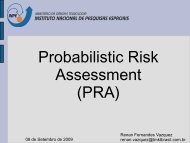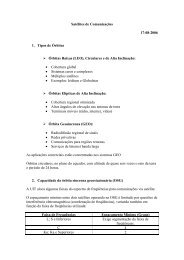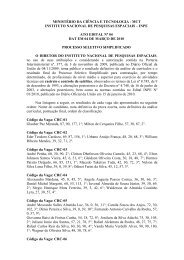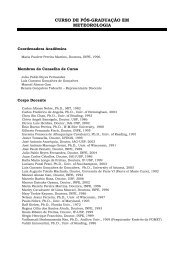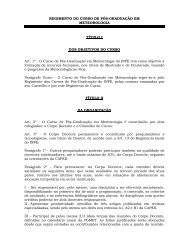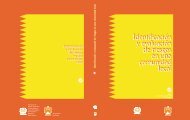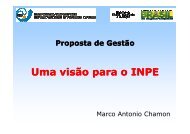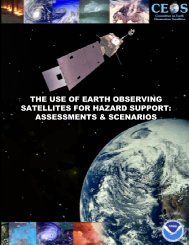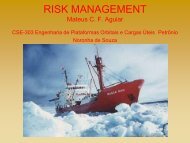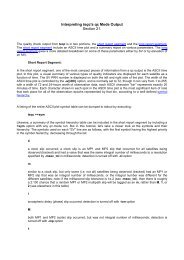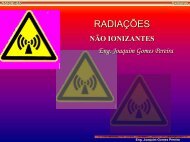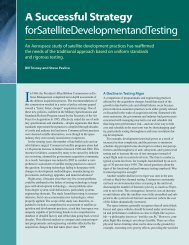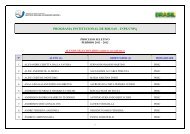Living with Risk. A global review of disaster reduction initiatives
Living with Risk. A global review of disaster reduction initiatives
Living with Risk. A global review of disaster reduction initiatives
You also want an ePaper? Increase the reach of your titles
YUMPU automatically turns print PDFs into web optimized ePapers that Google loves.
Annexes<br />
a2<br />
Organization <strong>of</strong> Eastern Caribbean States (OECS), Castries, St Lucia<br />
The OECS came into being on 18 June, 1981, when seven Eastern Caribbean countries signed a treaty agreeing to co-operate <strong>with</strong><br />
each other and promote unity and solidarity among the Members. It is composed <strong>of</strong> 9 Member States: Antigua and Barbuda,<br />
Dominica, Grenada, Montserrat, St. Kitts and Nevis, St. Lucia, St. Vincent and the Grenadines and 2 Associated Member States:<br />
Anguilla, British Virgin Islands. http://www.imf.org/external/np/sec/decdo/oecs.htm http://oecs.org<br />
Organization <strong>of</strong> Rural Associations for Progress (ORAP), Zimbabwe<br />
ORAP was founded in 1981 by a small group <strong>of</strong> people in Matabeleland Province to discuss development options following the<br />
independence war which ended in 1980. ORAP aims at creating employment and greater self reliance through promoting culturally<br />
relevant self-help activities. The organisation also aims at encouraging grassroots programme development and promoting economic<br />
and financial autonomy.<br />
http://iisd1.iisd.ca/50comm/commdb/desc/d41.htm<br />
Overseas Development Institute (ODI), United Kingdom<br />
Its mission is to inspire and inform policy and practice which lead to the <strong>reduction</strong> <strong>of</strong> poverty, the alleviation <strong>of</strong> suffering and the<br />
achievement <strong>of</strong> sustainable livelihoods in developing countries. It does this by locking together high-quality applied research, practi-<br />
policy advice, and policy-focused dissemination and debate. It works <strong>with</strong> partners in the public and private sectors, in both devel-<br />
pcal<br />
oping and developed countries. http://www.odi.org.uk/<br />
Pacific Tsunami Warning Centre (PTWC), Honolulu, Hawaii<br />
Established in 1949, the PTWC in Ewa Beach, Hawaii, provides warnings for tsunamis to most countries in the Pacific Basin as<br />
well as to Hawaii and all other U.S interests in the Pacific outside <strong>of</strong> Alaska and the U.S West Coast. Those areas are served by the<br />
West Coast / Alaska Tsunami Warning Center (WC/ATWC) in Palmer, Alaska. PTWC is also the warning center for Hawaïi’s local<br />
and regional tsunamis. http://www.prh.noaa.gov/pr/ptwc/<br />
Philippine Commission on Higher Education (CHED)<br />
CHED is mandated to undertake the following tasks: 1. Promote quality education; 2. Take appropriate steps to ensure that education<br />
shall be accessible to all; and 3. Ensure and protect academic freedom for the continuing intellectual growth, the advancement<br />
<strong>of</strong> learning and research, the development <strong>of</strong> responsible and effective leadership, the education <strong>of</strong> high level pr<strong>of</strong>essionals, and the<br />
enrichment <strong>of</strong> historical and cultural heritage. www.info.com.ph/~chedco<br />
Philippine Institute for Volcanology and Seismology (PHIVOLCS), Quezon City, Philippines<br />
The principal goal <strong>of</strong> PHIVOLCS is to formulate up-to-date and comprehensive <strong>disaster</strong> preparedness and loss <strong>reduction</strong> action<br />
plans for volcanic eruption, earthquake occurrences and related geotectonic processes/phenomena (e.g. faulting, landslides and<br />
tsunamis) which imprint significant impacts on man and his environment. A corollary goal is to exploit the positive aspects <strong>of</strong> these<br />
processes to uplift <strong>of</strong> the people’s quality <strong>of</strong> life. In line <strong>with</strong> its role in the promotion <strong>of</strong> science and technology in the<br />
country, PHIVOLCS undertakes activities geared towards making people aware <strong>of</strong> volcanoes and volcanology, earthquakes and seismology,<br />
and to understand why, where and how natural <strong>disaster</strong>s <strong>of</strong> volcanic and seismic origins occur in the Philippines.<br />
http://www.phivolcs.dost.gov.ph/<br />
Phnom Penh Regional Platform on Sustainable Development for Asia and the Pacific, Phnom Pehn,<br />
Cambodia<br />
The High-level Regional Meeting for the World Summit on Sustainable Development (WSSD) <strong>review</strong>ed the progress in the implementation<br />
<strong>of</strong> Agenda 21 in the region and identifies key policy issues, priorities, goals, constraints and actions in preparation for the WSSD.<br />
http://www.johannesburgsummit.org/html/prep_process/asiapacific.html<br />
PLANAT (Swiss National Platform for Natural Hazards), Bern, Switzerland<br />
The Federal Council aims to improve prevention in the field <strong>of</strong> natural hazards. To this end, it created the national PLAtform for<br />
NATural hazards - PLANAT. This consultative body <strong>of</strong> the Confederation is organized as an extra parliamentary commission.<br />
Whilst taking care to avoid a duplication <strong>of</strong> efforts, it also ensures a better use <strong>of</strong> the existing structures.<br />
http://www.planat.ch/e/index.htm<br />
Potsdam Institute for Climate Impact Research (PIK), Potsdam, Germany<br />
The founding <strong>of</strong> the Potsdam Institute for Climate Impact Research in 1992 arose out <strong>of</strong> the growing need among political decisionmakers<br />
to be informed about the consequences <strong>of</strong> Global Change. Of particular importance in this respect was the<br />
question <strong>of</strong> increasing concentrations <strong>of</strong> CO2 in the atmosphere and the effect this would have on climate, the environment and society.<br />
Since then PIK has been involved in investigating the ecological, geophysical and socioeconomic aspects <strong>of</strong> worldwide climatic change,<br />
and climate-impact research has become part <strong>of</strong> a comprehensive Earth system analysis. http://www.pik-potsdam.de/<br />
ProVention Consortium (Disaster Management Facility, World Bank)<br />
Its mission is “to help developing countries build sustainable and successful economies and to reduce the human suffering that too <strong>of</strong>ten<br />
results from natural and technological catastrophes”. The ProVention Consortium is a <strong>global</strong> coalition <strong>of</strong> governments, international<br />
organizations, academic institutions, the private sector, and civil society organizations aimed at reducing <strong>disaster</strong> impacts in developing<br />
countries. The Consortium functions as a network to share knowledge and to connect and leverage resources to reduce<br />
<strong>disaster</strong> risk. It focuses on synergy and coordination so that efforts, and benefits, are shared. http://www.proventionconsortium.org/<br />
359



